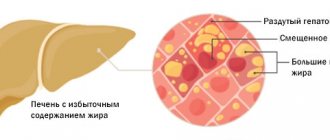What hormones prevent us from losing weight?
Sometimes it happens that all our efforts and efforts in losing weight end in nothing.
At some point, the fight against extra pounds becomes impossible, because... The cherished 4 kg remains to the desired goal, but the weight treacherously “rises” at a certain moment and it is completely unclear what to do with it when so much effort has been made. And it seems like you give up at such a moment and you don’t want to do anything else. Or maybe it’s just at this moment that we should think about the fact that our body has “sounded the alarm” and say thank you to the body and start to figure out what’s wrong! We all know how important hormones are for losing weight, because very often they are the culprits of excess weight. But, unfortunately, it is easier for us to close our eyes to some things than to find out the essence of the problem.
Let's find out!
Have you ever thought about how much hormones affect excess weight!? An excess of some hormones or a deficiency of certain other hormones blocks all weight loss efforts. By making a few minor changes to your lifestyle, your hormones will work for you rather than against you.
And now it’s time to find out which hormones prevent us from losing weight.
Female sex hormones and obesity
Everyone knows that overweight and obesity lead to the development of atherosclerosis, heart attack and stroke, as well as the formation of diabetes mellitus, degenerative joint diseases and osteochondrosis... and much more... In the end, excess weight is simply UNCOMFORTABLE! INCONVENIENT! UNBEAUTIFUL!
Did you guess that women are more prone to obesity than men? Already at birth, girls have more adipose tissue than boys. And starting from the prepubertal period (from about 10 years old), these differences become more pronounced. Fat reserves in girls are deposited in typical places, and the girl begins to look feminine.
Of course, plumpness can be attractive, and rounded female forms have never spoiled anyone. But, dear women, a BMI (body mass index) of 30 or more is the cause of various menstrual dysfunction. The reasons for this are that steroids accumulate in large amounts of adipose tissue, and the amount of active estrogens circulating in the blood decreases. Disturbances in the activity of the hypothalamus lead to disturbances in the menstrual cycle, its irregularity, hypomenstrual syndrome, and amenorrhea. Menstruation may be heavy with clots and painful. The number of ovulatory cycles per year may be reduced. The most severe complication of obesity during reproductive age is infertility.
There is a direct relationship between the increase in body weight and the severity of ovarian dysfunction and the decreasing frequency of pregnancies in alimentary obesity.
Did you know that extra pounds during pregnancy can cause the development of gestational diabetes mellitus, eclampsia, miscarriage and termination of pregnancy
?
Excess adipose tissue leads to changes in the production of sex hormones: the concentration of some increases; others – decreases; the function of some hormones is replaced. Ultimately, a state of hormonal imbalance is formed. Pregnancy against the background of hormonal imbalance can occur with various complications affecting both the health of the mother and the condition of the fetus.
Has it ever happened to you that you started to diet and lead an active lifestyle, but your weight remained the same or your weight loss was very slow?
Female sex hormones have a direct impact on the processes of weight gain and loss. Progesterone causes an increase in cortisol levels, increases appetite, inhibits digestive processes and metabolism, and promotes the rapid processing of carbohydrates into fats. The level of estrogen also affects the rate of accumulation of adipose tissue; when its level decreases, women begin to deposit male-type fat. But elevated estrogen levels also lead to poorly controlled weight gain. Hormonal imbalances lead to increased fat accumulation. Therefore, ONE diet is not enough to lose weight.
If you are overweight and planning a pregnancy, and something doesn’t work out. Or, simply, you started to gain weight, you can’t lose weight, “you’re on a diet, but the weight is not there,” sign up for a consultation with a gynecologist-endocrinologist. The doctor will prescribe additional examinations: ultrasound of the pelvic organs, ultrasound of the mammary glands, ultrasound of the thyroid gland, blood test for hormones. And, if hormonal disorders are detected, he will prescribe the necessary therapy.
Gynecologist-endocrinologists of the FAMILY CLINIC are always ready to help you. We have extensive experience in treating various hormonal disorders, and our slim and happy patients are the best proof of this!
High cortisol levels
Cortisol is a stress hormone that is designed to regulate your response to difficult situations. If you put yourself under too much stress (not getting enough sleep, a stressful job, problems in your personal life, junk food, too much caffeine), you can end up greatly increasing your cortisol levels.
When you're stressed, you're more likely to eat fatty and sugary foods to relieve your stress—a recipe for weight gain. Poor sleep will only increase your risk of obesity.
Weight loss hormones that affect weight
Hormones are special biologically active substances. They are of organic origin. They are produced in the endocrine glands. The task is to regulate the most complex organic processes. They have a direct effect on metabolism and physiological functions.
There are hormones on which not only the proper functioning of organs and systems, but also body weight depends. Their normal quantity is the key to a beautiful, slender body.
General characteristics for all substances from this list:
- Starting the fat burning process.
- Normalization of hormonal levels.
- Improved overall well-being.
- Losing weight.
How to properly and safely regulate hormonal levels? This is discussed in our article.
Leptin
It is produced by the fatty tissue of the body and is called the “hunger hormone”. The feeling of satiety largely depends on it, as it sends signals of satiety to the brain. If there is an excess of diet towards carbohydrate foods, the body begins to store carbohydrates in the form of fat deposits. Problem areas: thighs, legs, buttocks, abdomen.
The situation inevitably leads to an excess of the hormone in the body and subsequently to the formation of tolerance to it. This means that the brain does not receive satiety signals on time, and the person chronically overeats. He eats large portions of food regardless of whether he is hungry or already full.
Leptin levels can be adjusted. To do this you need:
- go to bed on time and ensure all measures necessary for a good night's rest;
- include foods high in omega-3 fatty acids (chia seeds, meat, fish) in your daily diet;
- take care of the correct daily routine;
- exercise regularly.
If these simple instructions are not followed, a person does not feel full. Pay attention to the following fact established by doctors: chronic lack of sleep alone leads to constant overeating!
Drugs to normalize hormonal levels
Many people think that hormone therapy with synthetic hormones will necessarily be used to increase hormone levels. But if it is possible not to use hormonal drugs, specialists usually do not prescribe them.
Quite often, doctors recommend diets, adjust lifestyle, and prescribe specific medications and vitamin and mineral complexes. For example, to normalize the level of thyroid hormones, iodine may be prescribed, since it is part of thyroid hormones.
For polycystic ovaries, the Diferton complex may be recommended, which contains two forms of inositol, alpha-lipoic acid, vitamins B9 and D3, and manganese. These substances help normalize the functioning of the ovaries, thereby reducing the level of male hormones and restoring the synthesis of female hormones.
And if prolactin is elevated, they may prescribe the Pregnoton vitamin and mineral complex, which contains vitex extract, as well as folic acid, vitamins, iodine, zinc and selenium, necessary to normalize the functioning of the reproductive system. Pregnoton has shown its effectiveness in cases of moderate hyperprolactinemia. In order to normalize hormonal balance, it can be prescribed even in the first trimester of pregnancy.
THIS IS NOT AN ADVERTISING. THE MATERIAL WAS PREPARED WITH THE PARTICIPATION OF EXPERTS.
Insulin
Important biologically active substances produced by the pancreas. Participates in the process of regulating glucose (sugar) levels in the blood. Their imbalance leads to various consequences, including serious diseases/pathologies, including diabetes.
If you can't lose weight, insulin production is likely impaired.
When you eat a lot of sugar-containing foods, your body has to work harder to produce it. In addition, the body needs to remove excess glucose through urine. In an attempt to do this, it converts excess sugar into fat reserves.
Measures to stabilize the amount of insulin:
- Take a glass of clean water with apple cider vinegar on an empty stomach in the morning, which is required to stabilize the amount of glucose (ratio - 250 grams of water and two tablespoons of vinegar);
- eating healthy foods containing large amounts of protein;
- inclusion of dishes with a low glycemic index in the menu.
You should add fresh fruits, legumes and low-starch vegetables to your menu.
Normalization of hormonal levels with folk remedies
Often problems in the body signal a hormonal imbalance. And if you try to self-medicate and normalize hormonal levels in women using folk remedies, you can only worsen the situation. Yes, some plants can really affect the production of certain hormones. The most effective of them, like the previously mentioned vitex, are used in traditional evidence-based medicine in effective dosages.
Therefore, in case of problems with hormonal levels, a woman should definitely contact an endocrinologist and gynecologist and strictly follow their recommendations.
Glucagon
The hormone glucagon, produced by the pancreas, unlike its cousin insulin:
♦ lowers cholesterol concentration;
♦ enhances the breakdown of fat cells;
♦ accelerates the excretion of sodium, while simultaneously reducing the load on the heart muscle;
♦ improves blood supply to the kidneys and accelerates recovery processes in the liver;
♦ maintains a stable release of glucose into the blood.
In addition, the hormone, when activated by adrenaline, increases the supply of oxygen to the muscles to replenish energy reserves in the body.
How to get it back to normal?
In this regard, listen to the advice below:
♦ the most interesting thing is that in order to enhance its production, it is necessary to move away from fractional meals, since with a longer break between meals (just not fasting), it increases the breakdown of fat;
♦ its production is noted after a 30-minute stable load, so sports can help you;
♦ increase the consumption of 2 amino acids, arginine and alanine;
♦ reduce the consumption of sweets.
Thyroid hormones
They regulate weight and are responsible for the speed of the metabolic process. With a deficiency, a disease develops - hypothyroidism, the symptoms of which are disruption of the digestive system, general asthenia, etc. An underactive thyroid gland leads to a slowdown in metabolism and weight gain. An excess of the hormone is just as undesirable as a deficiency.
Hormone levels can be adjusted if:
- drinking large amounts of water - about two liters per day;
- inclusion in the menu of foods rich in iodine, as well as herbs and citrus fruits;
- reducing caffeine-containing foods and refined carbohydrates in the diet.
Supplement your menu with the following foods: protein dishes, broccoli, spinach and kale. You need to avoid stress, get enough sleep, and spend a lot of time in the fresh air.
Cholecystokinin
The hormone cholecystokinin, produced by the intestines, is formed after eating certain foods. When released, it interacts with the nervous system and controls the process of digesting fat and protein at a slow pace. The longer this process, the longer the feeling of fullness will last.
Many, after eating fatty or protein foods, noted that hunger had passed, this is precisely the merit of cholecystokinin.
How to keep it normal?
Basically, in order for its production to be in the required quantity, it is necessary to take protein foods and Omega-3 fatty acids.
In other cases, doctors conducted experiments where they administered daily injections of leptin and cholecystokinin, as a result of which the subjects' weight decreased. However, this option for losing weight should only be under the supervision of an experienced specialist; it is not recommended to do it yourself at home.
Ghrelin
Unlike leptin, the hormone ghrelin is produced in the gastrointestinal tract and signals the brain when hunger occurs. A high concentration of the hormone is observed with anorexia and if you are on a low-calorie diet for a long time. It is interesting that the larger the volume of the stomach, the more actively ghrelin is produced.
Ghrelin is actively produced when the stomach is empty and decreases its activity when it is full. If its functioning is disrupted, saturation occurs late, which ultimately results in the body receiving excess calories.
How to ensure normal operation?
To do this, you must adhere to a number of rules:
♦ reduce alcohol consumption;
♦ minimize stressful situations if possible;
♦ do not stretch your stomach, so eat only moderate portions;
♦ devote time to physical activity.
In exceptional cases, to normalize the functioning of the hormone, the stomach is reduced surgically or by swallowing special balls that fill the excess space.









